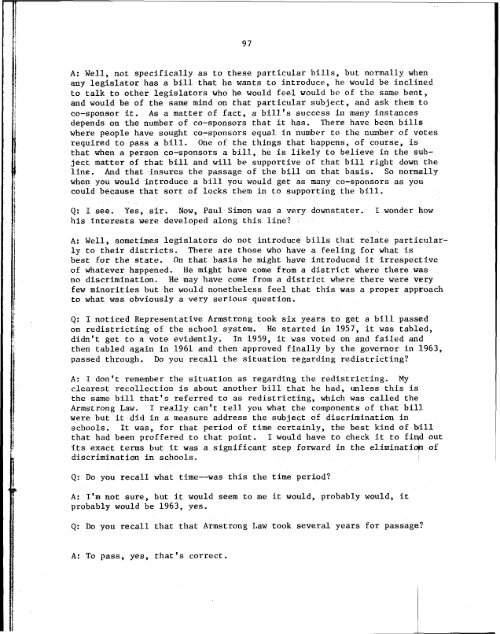Cecil A. Partee Memoir - University of Illinois Springfield
Cecil A. Partee Memoir - University of Illinois Springfield
Cecil A. Partee Memoir - University of Illinois Springfield
Create successful ePaper yourself
Turn your PDF publications into a flip-book with our unique Google optimized e-Paper software.
A: Well, not specifically as to these particular bills, but normally when<br />
any legislator has a bill that he wants to introduce, he would be inclined<br />
to talk to other legislators who he would feel would bc <strong>of</strong> the same bent,<br />
and would be <strong>of</strong> the same mind on that particular subject, and ask them to<br />
co-sponsor it. As a matter <strong>of</strong> fact, a bill's success in many instances<br />
depends on the number <strong>of</strong> co-sponsors that it has. There have been bills<br />
where people have sought co-sponsors equal in number to the number <strong>of</strong> votes<br />
required to pass a bill. One <strong>of</strong> the things that happens, <strong>of</strong> course, is<br />
that when a person co-sponsors a bill, he is likely to believe in the subject<br />
matter <strong>of</strong> that bill and will be supportive <strong>of</strong> that bill right down the<br />
line. And that insures the passage <strong>of</strong> the bill on that basis. So normally<br />
when you would introduce a bill you would get as many co-sponsors as you<br />
could because that sort <strong>of</strong> locks them in to supporting the bill.<br />
Q: I see. Yes, sir. Now, Paul Simon was a very downstater. I wonder how<br />
his interests were developed along this line?<br />
A: Well, sometimes legislators do not introduce bills that relate particularly<br />
to their districts. There are those who have a feeling for what is<br />
best for the state. On that basis he might have introduced it irrespective<br />
<strong>of</strong> whatever happened. He might have come from a district where there was<br />
no discrimination. He may have come from a district where there were very<br />
few minorities but he would nonetheless feel that this was a proper approach<br />
to what was obviously a very serious question.<br />
Q: I noticed Representative Armstrong took six years to get a bill passed<br />
on redistricting <strong>of</strong> the school system. He started in 1957, it was tabled,<br />
didn't get to a vote evidently. In 1959, it was voted on and failed and<br />
then tabled again in 1961 and then approved finally by the governor in 1963,<br />
passed through. Do you recall the situation regarding redistricting?<br />
A: I dan't remember the situation as regarding the redistricting. My<br />
clearest recollection is about another bill that he had, unless this is<br />
the same bill that's referred to as redistricting, which was called the<br />
Armstrong Law. I really can't tell you what the components <strong>of</strong> that bill<br />
were but it did in a measure address the subject <strong>of</strong> discrimination In<br />
schools. It was, for that period <strong>of</strong> time certainly, the best kind <strong>of</strong> bill<br />
that had been pr<strong>of</strong>fered to that point. I would have to check it to find out<br />
its exact terms but it was a significant step forward in the eliminati* <strong>of</strong><br />
discrimimat ion in schools.<br />
Q: Do you recall what time--was this the time period?<br />
A: I'm not: sure, but it would seem to me i.t would, probably would, it<br />
probably would be 1963, yes.<br />
4: Do you recall that that Armstrong Law took several years for passage?<br />
A: To pass, yes, that's correct.
















